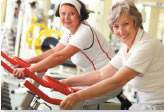
5 timeless habits for better health

What are the symptoms of prostate cancer?

Is your breakfast cereal healthy?

When pain signals an emergency: Symptoms you should never ignore

Does exercise give you energy?

Acupuncture for pain relief: How it works and what to expect

How to avoid jet lag: Tips for staying alert when you travel

Biofeedback therapy: How it works and how it can help relieve pain

Best vitamins and minerals for energy

Should you take probiotics with antibiotics?
Women's Health Archive
Articles
Why do women fall?
It's well known that women fall more often than men, but why is that so? A team of Canadian researchers tackled that question by looking for factors that tend to put women at higher risk than men for spills.
The researchers studied around 15,000 adults ages 65 and older who were enrolled in the Canadian Community Health Survey–Healthy Aging. All the participants were asked if they had suffered a fall serious enough to limit their normal activity. People who answered "yes" were then queried about their lifestyles and medical histories. When the researchers analyzed the answers, they determined that stroke, arthritis, and poor nutrition increased the risk of falls in both men and women. However, different risk factors were linked to falls for women, including being 85 or older, having at least one alcoholic drink a week, taking five or more medications, and having diabetes or osteoporosis. The findings were reported online Feb. 19, 2015, by the American Journal of Epidemiology.
Younger women get inadequate treatment for heart disease, survey finds
Younger women with heart disease may be unaware of their condition and may not recognize the symptoms of a heart attack, according to a report in the March 2015 issue of Circulation. The finding came from a survey of women under 55 who had survived heart attacks.
Researchers from the Translational Research Investigating Underlying Disparities in Acute Myocardial Infarction Patients' Health Status (TRIUMPH) study interviewed 30 women ages 30 to 55 who were hospitalized for heart attacks. They asked the women about their risk factors, the preventive measures they took the symptoms they experienced, and the treatment they sought and received.
Healthy lifestyle protects women against heart disease
It's no secret that healthy living can reduce your risk for developing heart disease. But ever wonder how much it may help? Up to 92%, suggests a study published Jan. 6, 2015, in the Journal of the American College of Cardiology. It evaluated health habits of 70,000 young and middle-aged women during a 20-year period. The habits included not smoking; exercising for at least 2.5 hours each week; watching TV for fewer than seven hours a week; consuming a diet rich in vegetables, legumes, and whole grains but low in red meat, refined grains, and sugar; consuming no more than one alcoholic drink daily; and having a body mass index in the normal range. Compared with women who had none of those habits, women with all six reduced their risk of developing heart disease by 92%. Why do those habits provide so much protection against heart disease? "Limiting TV watching frees up time for exercise, and the other activities are known to reduce blood pressure, LDL cholesterol, and blood sugar, which reduce the three major risk factors for heart disease—hypertension, high levels of cholesterol and triglycerides, and diabetes," says Dr. Randall Zusman, a cardiologist and Harvard Medical School associate professor. And even though the study involved young and middle-aged women, Dr. Zusman reminds us that it's never too late to adopt a healthy lifestyle.
Image: Thinkstock
Ask the doctor: Which supplements do I need?
Q. There seems to be agreement that supplements are worthless in supporting good health. I've been taking a multivitamin for older women for many years. I also take a calcium supplement since I am lactose intolerant. Should I discontinue the multivitamin, the calcium, or both?
A. You are definitely right about the recent consensus that most supplements, and certainly multivitamins, provide very little, if any, benefit to our health. So yes, stop taking the multivitamin. A far more important strategy to maintain good health is eating a diet containing lots of vegetables, fruit, whole grains, unsaturated fats, and small amounts of protein. Our bodies were designed to absorb nutrients from food, and that continues to be the best way to get them in our systems.
How you can drive safely at night
Changes in the aging eye may alter your night vision, but a few strategies can help you take to the road with confidence.
If you're over 50, you may be wondering if you should restrict your driving to the daylight hours. You may have read that your night vision declines at this age, or you may have noticed a little difficulty seeing in dim light. You may find glare from headlights bothersome.
Healthy travel: Don't let this common hazard spoil your best-laid plans
Long road trips also carry a risk of deep-vein thrombosis. Take a break to stretch your legs every hour or so. Image: Thinkstock |
Long trips come with an increased risk of blood clots deep in the leg veins, which can have serious complications.
Pelvic organ prolapse: You're not alone
Exchanging information with friends is one way to remove the stigma of pelvic organ prolapse. Image: Thinkstock |
Few women realize how common pelvic prolapse is—and how easily treated. Here are five things you should know.
Full bladder wakes women more often than thought
Two in three women over age 40 wake up at least once each night because of a full bladder, and nearly half make two or more nighttime trips to the bathroom. But only a quarter of women who get up to urinate during the night say they are bothered by having to do so.
That's the finding from a survey of more than 2,000 northern California women ages 40 and older. Factors that increased the likelihood that a woman woke at night to urinate included older age, past hysterectomy, hot flashes, and use of vaginal estrogen. However, the late-night bathroom breaks weren't caused by an overactive bladder or stress incontinence. The results were published in the January 2015 issue of the journal Obstetrics and Gynecology.
Feeling younger may mean living longer
Claiming to feel younger than your age isn't just whistling into the wind. It can also mean you have more years ahead than some of your former classmates. According to a report in the Dec. 15, 2014, issue of JAMA Internal Medicine, older people who felt three or more years younger than their chronological age had a lower death rate compared with those who felt their age or older.
Two researchers at University College London looked at the responses of about 6,500 men and women with an average age of 65 who answered the question, "How old do you feel you are?" About 70% reported that they felt three or more years younger than their years, while 25% felt close to their age, and 5% felt more than one year older than they were.
Stay a step ahead of urinary tract infections
Drink plenty of fluids to help flush out bacteria in the urinary tract. Drink enough each day so that your urine is almost clear in color. Image: Thinkstock |
Keep hydrated, and empty your bladder often to stave off these risky infections.

5 timeless habits for better health

What are the symptoms of prostate cancer?

Is your breakfast cereal healthy?

When pain signals an emergency: Symptoms you should never ignore

Does exercise give you energy?

Acupuncture for pain relief: How it works and what to expect

How to avoid jet lag: Tips for staying alert when you travel

Biofeedback therapy: How it works and how it can help relieve pain

Best vitamins and minerals for energy

Should you take probiotics with antibiotics?
Free Healthbeat Signup
Get the latest in health news delivered to your inbox!
Sign Up








